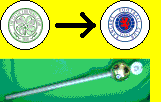





Club World Rankings.com |
 




|
Power Changes |
 |
Power Changes III |  |
|||||||||
| Posted 14.10.2010 by Mark de Vries
Looking at the all-time rankings, Real Madrid's lead is so massive it will realistically take at least another decade for any of the chasing pack (or should that read trailing pack?) to catch up with them. Los Merengues will complete their 53rd year at the top of the table on December 31, more than double the duration of their predecessors' reign, whose 25 years on top of world club footballing history was a record at the time. Yet Real weren't always world beaters. Having entered the Oosterpark Rankings in 61st place as early as 1905, a mere three years after their foundation as Madrid FC, courtesy of victory in the Spanish Cup they were able to defend successfully in the following three years, even their first two league titles in 1932 and '33 wouldn't bring them close to global fame. That would arrive with Santiago Bernabéu, Alfredo Di Stéfano et all. Real's 1955 league title, their second in succession, allowed them entry into the first edition of the European Cup, a competition they'd dominate during the first five years of its existence. It was during that period in the mid-1950s Real made rapid inroads into Rangers' lead in the all-time club world rankings. Having dropped to 34th before their 1954 league championship, the club regained their place in the top 20 (19th in '54) and subsequently moved into the top-10 for the first time the following year. To paint the picture: Rangers and Celtic were still in first and second in 1955, the year before European football came of age by introducing a genuine international club competition. Only these Scottish giants had broken the 1,000 points barrier (although Hungarian titans Ferencváros were just four points from joining them), the former leading their eternal rivals by over 400 points. Morley's Sceptre was safe at Ibrox it would seem. Enter aforementioned European Cup. Gabriel Hanot's invention. Suddenly, a lot more points were up for grabs in a single season, and Real's comeback from 2-0 and 3-2 down against Stade Reims saw them crowned champions of Europe for the first time. That promoted them to the 1,000+ Club, elevating Madrid to third all-time. A year later, upon retaining the European Cup, they split the Old Firm, something only Ferencváros had done - briefly - in the past thirty years. By 11 December 1957, Rangers, Scottish champions once more, were eliminated from the European Cup by AC Milan (6-1 on aggregate). Realistically, to keep hold of the Sceptre, they should've stopped Real Madrid themselves, yet this tough draw prevented them from even reaching the quarter finals. By mid-April the outfit from the Spanish capital had beaten their own city rivals, Atlético Madrid, to the Spanish crown. That yielded enough points to pass Rangers and reach the summit of the Oosterpark Rankings. Just for good measure, they went on to win the European Cup for the third time, defeating AC Milan in the final in Brussels. Quite how that European season would've unfolded without the Munich air disaster, we'll never know, but Real had earned their position as top dogs, becoming the first club to break the 2,000 points barrier. Their points total rapidly exploded, as Los Blancos reached 3,000 points just two years later (upon completing five-in-a-row in Europe and becoming the first-ever Intercontinental Champions). The 4,000 points mark was reached in '65, the next two milestones took eight and twelve years more respectively. To complete the list: 7k was achieved in 1989 and by the end of last century, the 8k hurdle was taken. Finally, Real Madrid became the first club to 9,000 points when they won their third European Cup (by now rebranded "Champions League") in five seasons, and their ninth overall, in 2002. During all that time, Franco's Favourites (however much they may have been, it won't have bought them their continental glory!) were often more than 40% and never below 30% ahead of all pretenders to their leading position. Just when, in the late 1990s, an Italian challenge in the shape of Juventus and AC Milan looked possible, Real hit back with their three CL titles. In recent years, Barcelona emerged as leaders of the opposition, but they've their work cut out. With the arrival of The Special One, Real will be looking to reassert their supremacy in both Spain and Europe alike. A Real Madrid on 10,000 points looks a lot more likely than any of their challengers nicking Morley's Sceptre from them! |
|||||||||||
 |
 |
||||||||||
 |
Power Changes II |  |
|||||||||
The second installment of the Power Changes series is about the shortest reign in the history of the Oosterpark Rankings. At the dawn of organised football, Wanderers FC soon hit top spot in the all-time rankings by virtue of winning the first two FA Cups ever organised. Having followed those up with another hattrick of Cup triumphs between 1876 and 1878, they would never even add a solitary point to the 150 those early successes were rated at. Still, a decade on, they were still holders of Morley's Sceptre, but when the first-ever Football League kicked off on 8 September 1888, all of a sudden the number of points available in a season increased threefold. It was as good a time as any for a challenger to (by now defunct) Wanderers' top spot to start picking up silverware. As the league consisted of just 12 clubs at the time, and thus only 22 games per side, the first champions were known just a few days into the new year (1889). They went by the name of Preston North End. Not only did they win the league, the Lancashire outfit did so unbeaten, adding some very useful bonus points in their quest for the Sceptre. Not until Arsenal in 2004, a full 115 years later, would England see another side crowned league champions unbeaten. In their greatest season ever, Preston also became the first club to do the Double, as they defeated Wolverhampton Wanderers 3-0 in the FA Cup Final. Fred Dewhurst showed them the way by scoring the first goal, something not unfamiliar to him, as Dewhurst was the player to score the first-ever league goal at the correct end. Aston Villa's Gershom Cox unwillingly scored the very first goal in Football League history: an own goal, much to the delight of Wolves (!). That campaign put Preston in third place all-time, behind Queen's Park of Glasgow as well. While they won the Scottish Cup for the ninth and penultimate time in 1890, even adding the Glasgow Cup in the same year wasn't enough to bring them Morley's Sceptre as Preston North End successfully defended their English league crown, finally ending Wanderers' 18-year reign. Preston wouldn't stay top dogs very long, as Blackburn Rovers dislodged them just a year later, but they will forever have their place in history as one of (currently) only seven clubs to have been the most successful of all-time at some stage. |
|||||||||||
 |
 |
||||||||||
 |
Power Changes |  |
|||||||||
In a new series of articles, we'll have a look at the power changes in the all-time club world rankings.  Now, usually people would associate the words
"1933 rise to power" with your man on the left, but here at the Oosterpark Rankings, we're actually thinking more of the coup that took place
in Glasgow. Now, usually people would associate the words
"1933 rise to power" with your man on the left, but here at the Oosterpark Rankings, we're actually thinking more of the coup that took place
in Glasgow. After an 18-year reign, Celtic, who had become the first Scottish holders of Morley's Sceptre, were dethroned by their city rivals Rangers.
After an 18-year reign, Celtic, who had become the first Scottish holders of Morley's Sceptre, were dethroned by their city rivals Rangers.The power shift had been coming for some years, with leaders Celtic winning just two league championships in the 1920s, the last in 1925. The other eight titles that decade went to Rangers. One could say not much has changed in nearly a century! The green half of Glasgow managed to keep hold of the sceptre by virtue of a handful of Scottish and Glasgow Cup wins at a time when full European competitions were yet to be invented. By 1928, Rangers had risen to second in the all-time rankings, making it a Scottish 1-2 for the first time. Now 166 points (20.6%) behind Celtic, their challenge really took off. The men in blue went on to make it five league titles on the trot between 1927 and 1931, a club record at the time. In 1932 the Old Firm were beaten, not that surprisingly and certainly not undeservedly by Motherwell, who were league runners-up four times in the late 1920s and early 1930s, and three-time beaten cup finalists in the latter decade as well. Because of that, Rangers, who won Scottish Cup and Glasgow Cup that year, came up 15 points short at the end of '32. The writing was on the wall, though, and when the 1932/33 league season became a two-horse race between Motherwell and Rangers, all Celtic could do was win the Scottish Cup and pray for the claret and amber side to keep them on top of the world. On April 15, Celtic kept their part of the bargain, actually defeating Motherwell 1-0 in the Cup Final, but by the following Saturday Rangers had been crowned champions. The 43 points that came with it put the blue half of town four ahead of the Bhoys, starting a 25-year spell at the top of the Oosterpark Rankings, thereby lasting twice as long as dubious moustaches were in fashion on the continent. Rangers and Celtic would pass each other four more times in history, but never again would Morley's Sceptre be at stake. |
|||||||||||
 |
 |
||||||||||